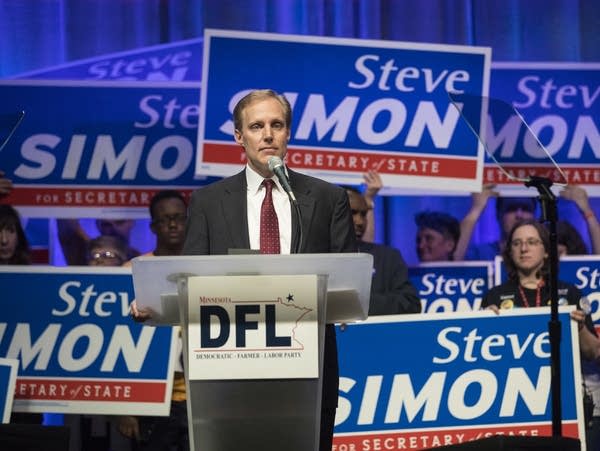Secretary of state candidates talk election security, Minnesota's 'superiority complex'

Go Deeper.
Create an account or log in to save stories.
Like this?
Thanks for liking this story! We have added it to a list of your favorite stories.
Updated: 9:51 a.m. | Posted: 6 a.m.
Steve Simon is the only person on the ballot this cycle who has to oversee his own election.
As the incumbent secretary of state seeking re-election this fall, he's both running for office and traveling the state to talk about election administration, from getting out to vote to ballot security. The election administration piece is keeping him busier these days.
Turn Up Your Support
MPR News helps you turn down the noise and build shared understanding. Turn up your support for this public resource and keep trusted journalism accessible to all.
Minnesota is one of 21 states where election systems were targeted by Russian hackers two years ago. They didn't get in, but Simon has been given access to intelligence briefings with the federal government to make sure it doesn't happen on Election Day, Nov. 6.
Election security is also one of the top issues he's talking about as he seeks a second term as secretary of state, facing a challenge from former Republican state Sen. John Howe and Independence Party candidate William Denney. Simon won his race two years ago by fewer than 25,000 votes.
"I still maintain that the No. 1 threat to the integrity of our elections is the prospect of some coordinated attacks," Simon said. "We were targeted in 2016, so that is something we live with and must act on."
In 2015, Simon said he started a cybersecurity team in the secretary of state's office and they recently announced a partnership with Microsoft to "harden" the state's election cyber defenses.
But Howe said Simon didn't do enough during the last legislative session to push the Legislature and governor to allow his office access to more than $6 million in federal funds for election security.
Language to authorize him to use that money was vetoed in a larger budget bill that included things Gov. Mark Dayton opposed.
"Not one dime of that money has been spent," Howe said. "My opponent has failed to get the job done. He will blame the legislative body, but the fact of the matter is, he is secretary of state and he failed."
Howe said one thing the office can do to improve cybersecurity is to work with the Minnesota National Guard, which has already created a cybersecurity unit and systems. He wants their work applied to elections and all state agencies.
But Howe is also tapping his background running a chain of Sears stores to highlight other parts of the secretary of state's office, particularly business administration. All businesses must register with the secretary of state's office.

Howe said he wants to improve education about registering a business.
"You have to re-registered every year. If you fail to register, someone else can grab your business entity name. It actually happened to me once," he said. "I want to use the office as a one stop shop to answer business questions, but also to encourage businesses to open."
Denney is also in business — he works for in compliance for a plastic manufacturing company in Vadnais Heights — but he said he's in the race to help build a multiparty system in Minnesota and talk about issues the other candidates ignore.
He wants the state to adopt a ranked-choice voting system, which is currently only used in cities like Minneapolis and St. Paul. He also wants to increase the number of seats in the Minnesota House of Representatives and state Senate, where he said some rural districts have grown much too large.
"Our population has been growing but we haven't been adding more legislators, especially out in these rural districts, some of these districts span 50 miles or more," he said. "We need more and smaller and more representative districts."
Another major issue for Simon is voter turnout. The 2014 midterm, the year he was elected to the job, Minnesota fell from No. 1 in the U.S. for overall voter turnout to No. 6.
In 2016, the last presidential election, Minnesota climbed back up to No. 1 in voter turnout. Howe said Simon claiming credit for voter turnout is "a little like the rooster taking credit for the sun coming out," he said. "Donald Trump and Hillary Clinton drove voter turnout up."
But Simon expects turnout to be high again this year, in part because of efforts from his office. That includes engaging high school and college-age voters, pushing for expanded early voting laws and increasing the number of printed languages for the state ballot instructions.
Early voting numbers are already high for a Minnesota midterm election, and he hopes the state leads the nation again.
"I'm happy to indulge our Minnesota superiority complex," he said. "We love to be high on lists of rankings."



